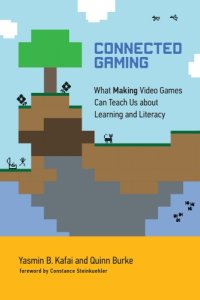
Ebook: Connected gaming: what making video games can teach us about learning and literacy
Author: Burke Quinn, Kafai Yasmin B
- Tags: Computer programming--Study and teaching, Computers and children, Constructivism (Education), Learning Psychology of, Video games--Design, Video games in education, Computer programming -- Study and teaching, Video games -- Design
- Series: John D. and Catherine T. MacArthur Foundation series on digital media and learning
- Year: 2016
- Publisher: The MIT Press
- City: London;Cambridge;MA
- Language: English
- pdf
Introduction -- The serious side : making games for learning -- The social side : making games together beats making them alone -- The cultural side : rethinking access and participation in gaming -- The tangible side : merging old materials with new interfaces for gaming -- The creative side : tools for modding and making games -- Connected gaming for all.;Over the last decade, video games designed to teach academic content have multiplied. Students can learn about Newtonian physics from a game or prep for entry into the army. An emphasis on the instructionist approach to gaming, however, has overshadowed the constructionist approach, in which students learn by designing their own games themselves. In this book, Yasmin Kafai and Quinn Burke discuss the educational benefits of constructionist gaming--coding, collaboration, and creativity--and the move from "computational thinking" toward "computational participation." Kafai and Burke point to recent developments that support a shift to game making from game playing, including the game industry's acceptance, and even promotion, of "modding" and the growth of a DIY culture. Kafai and Burke show that student-designed games teach not only such technical skills as programming but also academic subjects. Making games also teaches collaboration, as students frequently work in teams to produce content and then share their games with in class or with others online. Yet Kafai and Burke don't advocate abandoning instructionist for constructionist approaches. Rather, they argue for a more comprehensive, inclusive idea of connected gaming in which both making and gaming play a part. -- Provided by publisher.
Download the book Connected gaming: what making video games can teach us about learning and literacy for free or read online
Continue reading on any device:

Last viewed books
Related books
{related-news}
Comments (0)